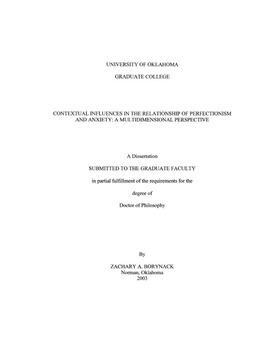| dc.contributor.advisor | Pace, Terry M., | en_US |
| dc.contributor.author | Borynack, Zachary Alexander. | en_US |
| dc.date.accessioned | 2013-08-16T12:19:04Z | |
| dc.date.available | 2013-08-16T12:19:04Z | |
| dc.date.issued | 2004 | en_US |
| dc.identifier.uri | https://hdl.handle.net/11244/642 | |
| dc.description.abstract | The purpose of this study was to investigate contextual differences in anxiety and perfectionism in the context of academic performance. Two hundred and fifty-eight participants were recruited from an undergraduate psychology course in a public, south central university. These participants were randomly assigned to one of two conditions. The experimental condition was presented with an academic scenario using guided imagery, while the control condition was not. Both conditions completed a protocol consisting of the Almost Perfect Scale-Revised (APS-R), the Multidimensional Perfectionism Scale (MPS), and the State-Trait Anxiety Inventory (STAI). The experimental condition completed an additional survey, the Scenario Rating Scale, developed by the researcher. Cluster analyses were conducted to assign participants within each condition to Adaptive, Maladaptive, and Nonperfectionist groups. Analyses of Variance indicated significant differences in Standards, Discrepancy, and State and Trait Anxiety between the conditions and among perfectionism groups. Interactions between condition and perfectionism groups were indicated for two dependent variables: Standards and Trait Anxiety. Standards for Nonperfectionists were significantly higher in the experimental condition, while the other two groups did not change. These results are evident of a contextual dimension for perfectionism. Trait Anxiety for Maladaptive perfectionists was also significantly higher in the experimental group, while the other two groups did not change. This interaction clarified the main results, indicating that Adaptive perfectionism is a quality that serves as a protective agent, moderating the effect of trait anxiety in anxiety provoking situations. Conversely, Maladaptive perfectionism was found to be a factor of vulnerability to anxiety provoking situations. | en_US |
| dc.format.extent | ix, 169 leaves : | en_US |
| dc.subject | Anxiety. | en_US |
| dc.subject | Perfectionism (Personality trait) | en_US |
| dc.subject | Psychology, Personality. | en_US |
| dc.subject | Psychology, Clinical. | en_US |
| dc.subject | Context effects (Psychology) | en_US |
| dc.title | Contextual influences in the relationship of perfectionism and anxiety: A multidimensional perspective. | en_US |
| dc.type | Thesis | en_US |
| dc.thesis.degree | Ph.D. | en_US |
| dc.thesis.degreeDiscipline | Department of Educational Psychology | en_US |
| dc.note | Major Professor: Terry M. Pace. | en_US |
| dc.note | Source: Dissertation Abstracts International, Volume: 64-09, Section: B, page: 4603. | en_US |
| ou.identifier | (UMI)AAI3104366 | en_US |
| ou.group | Jeannine Rainbolt College of Education::Department of Educational Psychology | |
